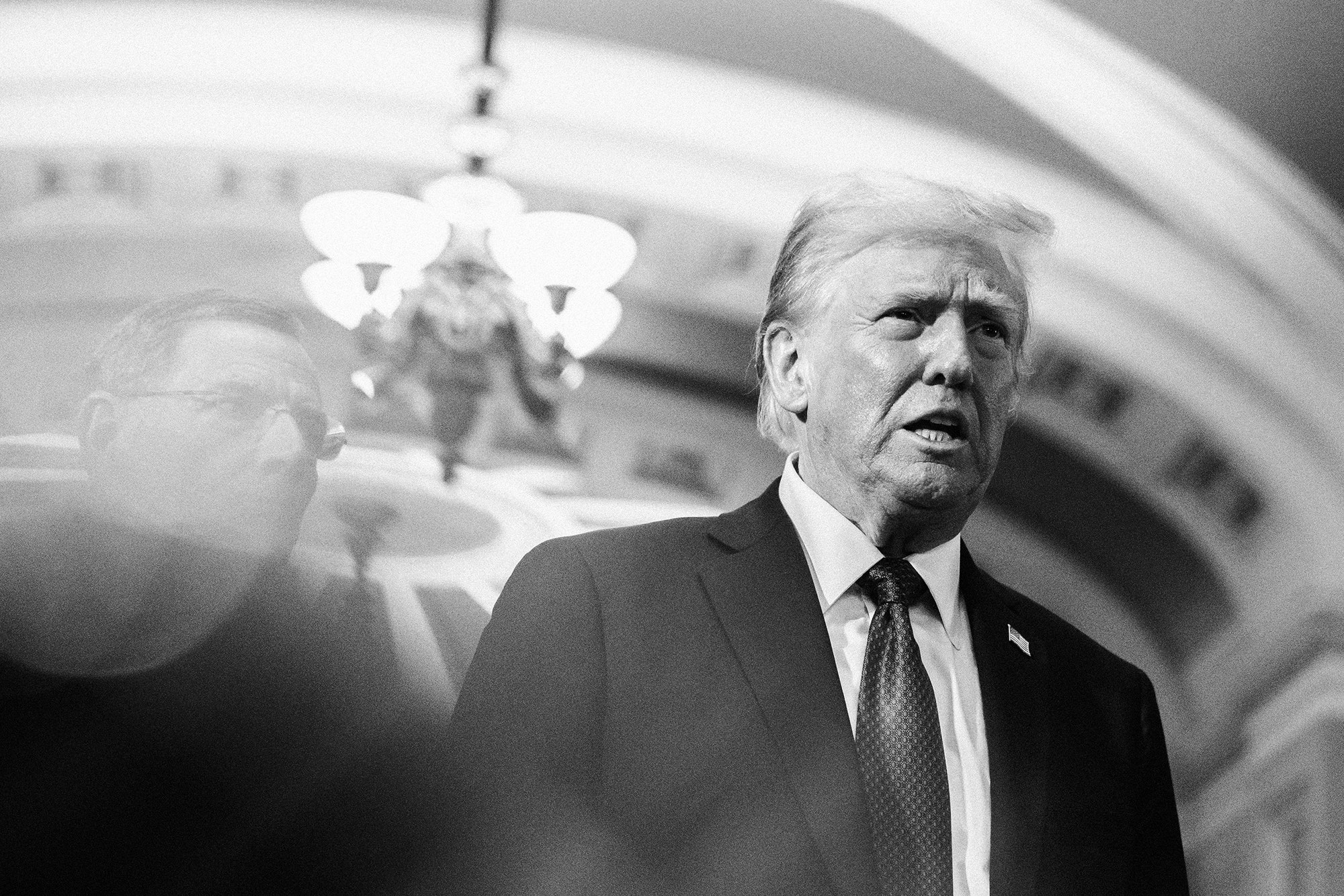Nearly two decades ago, Donald Trump and Stormy Daniels met at a celebrity golf tournament. According to Daniels, it was a tryst in his hotel room that night that set off the first criminal trial of a former president, let alone a future one. Trump has denied sleeping with the adult film star, but the events of their encounter reverberated up until the conclusion of his third presidential campaign last year. In the spring, as he waged his effort to regain the White House, Trump was convicted on 34 counts of falsifying business records in order to cover up a hush money payment to Daniels.
On Friday, 10 days before his second inauguration, the president-elect appeared again in the Manhattan courtroom where he stood trial—this time over video call. His appearance culminated a protracted period of legal wrangling to undo his conviction, or at least prevent it from being formalized in a sentencing. On Thursday night, the Supreme Court narrowly denied him a further stay, forcing Trump back into court to receive his punishment.
He appeared virtually from Florida, alongside his attorney Todd Blanche, with a pair of American flags serving as backdrop. (Blanche is slated to become the Department of Justice’s second-highest-ranking official under his client’s administration.) The judge in the case, Justice Juan Merchan, had already indicated that, under the extraordinary circumstances of Trump’s imminent return to the presidency, he would not be imposing a prison sentence. Instead, he proposed an unconditional discharge, under which Trump would not pay a fine or serve time, but remain a convicted felon.
The hearing lasted about 30 minutes and, with the prosecution also recommending an unconditional discharge, had the primary players in the room largely on the same page. As Manhattan prosecutor Joshua Steinglass spoke, Trump shook his head a bit, but he mostly looked bored, as he did throughout the trial.
Trump “purposely bred disdain for our judicial institutions and the rule of law,” Steinglass said, taking a final opportunity to weigh in on the stakes at hand even as the president-elect would walk free. “He’s done this to serve his own ends.”
In response, Blanche took aim at the case itself. “What the government just said presupposes something that we disagree with,” he said, echoing Trump’s attack line throughout the trial (and on the campaign trail). “That this was an appropriate case to be brought.” He claimed that it was not just he, Trump, and a go-to coterie of legal experts that agreed on this point.
“The majority of the American people also agree that this case should not have been brought,” Blanche said.
During the spring trial proceedings, Trump stalked into the room every morning, composing his face into a defiant stare as press photographers took his daily portrait. In this instance, his presence was so fleeting as to feel perfunctory—but it did feature a short speech. The talking points were similarly familiar, with repeated gestures toward the opinions of legal commentators whom he viewed as favorable and a healthy sprinkling of the phrase “from what I’ve heard.”
“I did nothing wrong,” Trump said in concluding his typically meandering remarks. “I’d just like to explain that I was treated very, very unfairly. And I thank you very much.”
Merchan’s turn to speak at the end of the hearing seemed to hold the most potential for narrative deviation. The court allowed media organizations to record audio of the proceedings, a first for this trial, prompting some speculation among reporters that the judge, measured and fluid even by the standards of his profession, might speak more candidly about a defendant who has made sport of attacking him on social media and on the campaign trail.
But in the end, the justice seemed to acknowledge how the long tail of the affair had ultimately been subsumed by Trump’s decisive reelection. He explained to the defendant why the demands of the presidency meant that he would issue an unconditional discharge, and he offered a parting thought: “Sir, I wish you Godspeed as you assume a second term in office.”
More Great Stories From Vanity Fair
Burning at Both Ends: Surviving a Week in Wildfire-Torn Los Angeles
MAGA-verse’s Clash of Titans
Lucy Liu Has No Regrets on Speaking Out About Bill Murray
Prince Harry Planted a Ticking Time Bomb Under the Murdoch Empire
Mark Zuckerberg Doubles Down on the MAGA-fication of Meta
Alan Cumming Needs to Be Psychiatrically Evaluated
The Biggest Snubs and Surprises From the 2025 SAG Awards Nominations
The Best Rom-Coms of All Time
From the Archive: Portraits of Picasso’s Marriage

